
The WA Folklife Project is a collaboration between the National Library of Australia, the Australian Folklore Research Unit at Curtin University and the Australian Folklore Network. The collecting, recording and documentation of the folklore of Western Australians has been conducted by fieldworkers Rob and Olya Willis since 2004. They have collected a substantial body of material that would otherwise have remained undocumented.
While some collecting work has been carried out previously in this area, the Folklife Project is the first sustained and focused collecting project undertaken by professional fieldworkers using high quality equipment. Funding and recording equipment is supplied by the National Library of Australia and in WA, Curtin University's Folklore Research Unit has provided project development and management support. [9]
The research output and reports of the Folklife Project are deposited with the National Library of Australia and the Western Australian Folklore Archive. Interviews have been conducted each year since 2004, with the exception of 2008, when no fieldwork took place. Reports, interviews on CD and images document the work undertaken for this project.
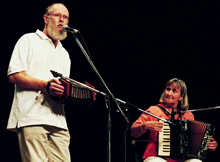
Rob and Olya Willis performing
at a folk festival.
Image courtesy of Rob & Olya Willis.
Western Australian Folklife Project reports and research, 2004
The first phase of the project in 2004 took place in Perth, Fremantle, the south west of WA, Broome and Derby. As well as Swiss and Urkainian song, music and dance tradition, folklore and social history topics recorded included: Australian country music and travelling shows, comedy traditions, migration to WA and farming conditions, Indigenous discrimination, home remedies and folk medicine, children's folklore, art and craft, dancing and social customs, development of tourism, folk revival, traditions and customs of blacksmithing, Indigenous lore and song (in language), preservation of ethnic culture and the early Rock 'n' Roll era in WA. [10]
Western Australian Folklife Project reports and research, 2005
In 2005, the project had a range of different foci: the musical, food, religious and handcraft traditions of the Perth Greek community; the life histories and traditions of timber workers and their families; bush railways; and the now-sunken timber town of Banksiadale. [11]
Western Australian Folklife Project reports and research, 2006
The 2006 phase of the project involved an investigation of the history and traditions of the Western Australian whaling industry, including Cheyne's Beach Whaling Station in Albany. Parts of this investigation were a follow-up to a joint project conducted by the National Library of Australia and the State Library of WA in the early 1990s. 2006 topics included WA Irish community music, song, dance and other traditions, child migration and migration traditions from Persia, Iran and India. A concert of music and songs from the sheet music collection of the State Library of Western Australia was also recorded. [12]
Western Australian Folklife Project reports and research, 2007
In 2007, Rob and Olya Willis and Graham Seal presented aspects of the Folklife Project fieldwork at the Fairbridge Festival in WA. A further six interviews were conducted. These were mainly follow-ups to 2006 interviews on Irish and child migration traditions as well as one interview on World War II Prisoner of War songs. [13]
No fieldwork was conducted in 2008.
Western Australian Folklife Project reports and research, 2009
In 2009, the fieldworkers visited in two periods. In June 2009, Rob and Olya spent a week at Geraldton Primary School to document children's playground traditions in conjunction with the ARC Linkage project Traditions of Childhood. Also, they conducted interviews with members of the Nunda Community in Geraldton and Kalbarri covering oral traditions of their Dutch shipwreck ancestry and other folklore as part of an ongoing Curtin University-led research prject on the pre-1788 European settlement of Australia. In August, Rob and Olya spent two weeks in Perth and Fremantle interviewing Australian submariners, the creative arts community, folk revival performers and local newspaper proprietors. [14]
Rob and Olya Willis
Rob Willis is a folklore collector and oral historian. He has collected songs and stories throughout rural Australia. A self-taught musician, Rob learnt to play music by ear. Most of his collecting and oral history work is housed in the National Library of Australia. Rob has written and contributed to a number of articles and publications relating to folklore. [15]
Olya Willis is a musician, performer and primary school teacher. She has been involved in the recording of Social History and Folklore for the National Library of Australia since the mid-1980s. Olya has assisted in the production of themed concerts at major Folk festivals across Australia, conducts workshops on music, dance and performance, and has a special interest in children's folklore. [16]
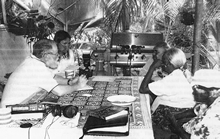
Recording at Derby. [L-R]: Rob Willis,
Kevin Shaw, Lucy Marshall,
Jenny Warbie, Daisy Longunan.
From Report on the
WA FolklifeProject 2004.
CUL00079/1/1.
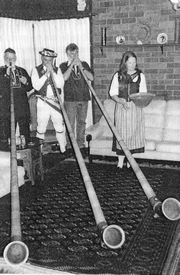
Recording Swiss traditions, in
Perth, W.A. From Report on the
WA Folklife Project 2004.
CUL00079/1/1.
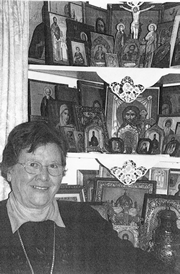
Recording stories of Greek
Orthodox religious icons with
Mrs Katina Asvesti, Perth, W.A.
From Report on the WA Folklife
Project 2004. CUL00079/1/1.
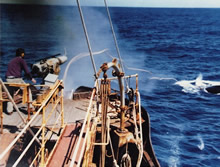
Image from the personal collection of
Kees Van der Gaag. Interview of
Kees Van der Gaag by Rob Willis,
2006. CUL00079/2/5
 |
||||||||